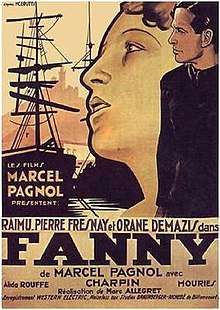Fanny (1932 film)
| Fanny | |
|---|---|
 | |
| Directed by | Marc Allégret |
| Produced by |
Pierre Braunberger Roger Richebé |
| Written by | Marcel Pagnol |
| Based on |
Fanny by Marcel Pagnol |
| Starring |
Raimu Orane Demazis Pierre Fresnay |
| Music by |
Vincent Scotto Georges Sellers |
| Cinematography |
Nicolas Toporkoff Roger Hubert George Benedict André Dantan |
| Edited by | Jean Mamy |
| Distributed by | Mediterranean Film Company |
Release date |
|
Running time | 104 minutes |
| Country | France |
Fanny is a 1932 French romance and drama film directed by Marc Allégret, based on the play by Marcel Pagnol. It is the second part in the Marseillaise film trilogy that started with Marius (1931) and concluded with César (1936). Like Marius, the film was a box office success in France and is still considered to be a classic of French cinema.
Plot
The story takes place in Marseille. Marius, the son of barkeeper, César, had a romance with Fanny, a neighbourhood girl and daughter of the fish salesman in the harbor. Marius then followed his dream by sailing away to travel the seven seas. Fanny then discovers she is pregnant by Marius, a shameful position in the community since she's a single mother with a father unable to secure the future of her and her child. She acquiesces with her mother's advice to marry a more prosperous salesman in the harbor, Honoré Panisse, who is 30 years older than she is. A few months after the marriage and the birth of the baby, Marius returns and tries to win back Fanny.
Cast
- Fanny Cabanis (Orane Demazis)
- César Olivier (Raimu)
- Honorine Cabanis (Alida Rouffe)
- Honoré Panisse (Charpin)
- Albert Brun (Robert Vattier)
- Félix Escartefique (Auguste Mouries)
- Claudine Foulon (Milly Mathis)
- Mangiapan (Marcel Maupi)
- Félicien Venelle (Édouard Delmont)
- Elzéar Bonnegrâce (Louis Boulle)
- Fortunette (Odette Roger)
- Amélie (Annie Toinon)
- André Gide and Pierre Prévert have cameos
In popular culture
- The famed restaurateur and founder of California cuisine, Alice Waters, was so taken by this film that she named her Berkeley restaurant "Chez Panisse". The café located above the restaurant is decorated with posters from the films Marius, Fanny, and César. [2]
- In 1984 Waters opened a small breakfast café in Berkeley. Café Fanny is named after the heroine of Marcel Pagnol's 1930s Marseilles movies (as is Alice Waters' daughter). This film series tells a love story involving the whole community, centered on a little standup café. Waters wanted to evoke its spirit, an ideal reality where life and work are inseparable, and the daily pace of life leaves time for the afternoon anisette or the restorative game of petanque. Eating together nourished the spirit as well as the body since the food was raised, harvested, hunted, fished and gathered by people sustaining and sustained by each other and by the earth itself. The café closed in March 2012. (http://cafefanny.com/history.html)
- The main characters from the films Marius, Fanny, and César make a cameo appearance in the Asterix comic book Asterix and the Banquet. The pétanque playing scene in the comic book is a reference to a similar scene in this film.[3][4]
See also
- Port of Seven Seas is James Whale's remake of Marius and Fanny.[5]
- Fanny, a 1961 remake of the 1932 version.
- Fanny, a 2013 adaptation of the play, directed, written and starring Daniel Auteuil
External links
| Wikimedia Commons has media related to Fanny (1932 film). |
Notes
- ↑ "Fanny". Bifi.fr. Archived from the original on November 4, 2014. Retrieved November 2, 2012.
- ↑ "Fanny (1932)". Retrieved 16 March 2018 – via www.imdb.com.
- ↑ Rivière, Stéphane. "Les allusions dans Astérix : Marcel Pagnol". www.mage.fst.uha.fr. Retrieved 16 March 2018.
- ↑ "Astérix – Page introuvable". www.asterix.com. Retrieved 16 March 2018.
- ↑ "Port of Seven Seas (1938) - IMDb". Akas.imdb.com. Retrieved 2013-09-16.